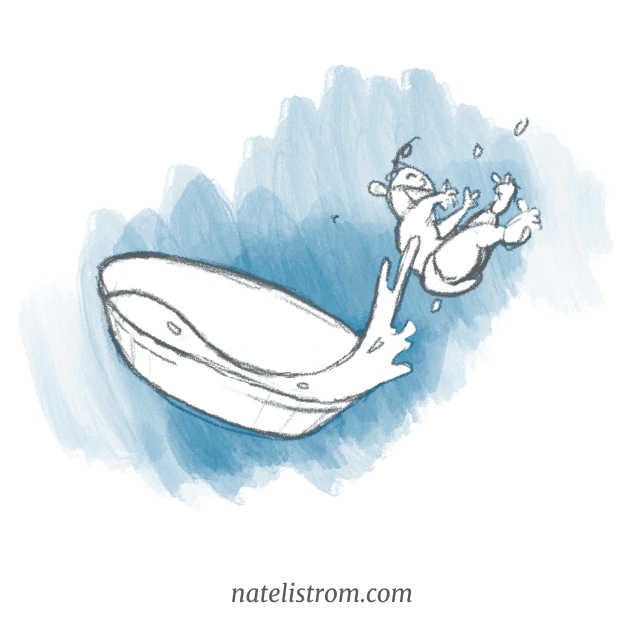The skills to analyze and synthesize are different things
Summary: There’s a popular saying that ‘those who can’t do, teach,’ but the truth is more nuanced.

When I first heard the saying, “those who can, do; those who can’t, teach,” A it was said with a derogatory implication. Incapable of performing practically, a person falls back to merely sharing theoretical knowledge about a topic. By implication, only people who actually do a task are worth listening to, never those just talking about it.
I have to admit this stings a bit. My own interest in story theory developed because I wrote a 120K-word rough draft of a novel and then realized I had no idea how to revise it. From there, I began to research how to edit stories. I went down the rabbit hole and ended up falling in love with story theory as a study in itself.
Nearly everything I do in my notes here is theoretical analysis. Does this make me one of the failures? Someone who couldn’t do and so fell back to teaching?
The critique
Some would say yes. Working screenwriter Paul Guyot recently published Kill the Dog, a scathing critique of the screenwriting guide industry.
“Professors and authors of How-To books love to break down, reverse-engineer, and analyze movies and television episodes, pointing out the different formulas and what they mistakenly call structure . . .
See? Here’s the Hero’s Journey. See? Here’s Snyder’s Beats.
If you research the professors who are teaching screenwriting across the United States (and I have), you will see that less than 10% of them have any genuine experience as professional screenwriters.” (Guyot, Pages 97-98)
Storyworthy author and multi-time storytelling competition champion Matthew Dicks piles on:
“Writing teachers often are not writers themselves and therefore never engage in the writing process in an authentic, honest way. Rather than teaching the writing process followed by actual writers, they speculate about strategies that might help a writer or follow the advice written in writing tomes by people who only write writing tomes, often doing more damage than good.” (Dicks, Page 65)
Guyot directly attacks and dismisses many of the authors from whose insights I have benefited and with whom I interact. Dicks is a bit gentler but says basically the same thing.
Is it all smoke and mirrors, so much useless, ultimately impractical effort?
Maybe. But maybe not.
The bathwater and the baby
Goyot, Dicks, and others have some valid points. They’re right to be skeptical of the outlandish claims that “such-and-such is the only way to do story,” or “you must have a thingamajigger on page 18 and not a page before or after.” (I like Tom Vaughan’s framing that these prescriptions are like “training wheels.”)
If you’re not testing the tools yourself, there is a very real danger of a “blind leading the blind” situation. You can end up unknowingly repeating advice from people who don’t have any relevant insights at all.
The saying goes that during the California Gold Rush, the real people who made all the money weren’t those who were mining for gold but those who were selling the pickaxes. There’s a ready market of people like myself, who want to learn how to tell a good story and are willing to buy a book or two, attend a workshop, or complete a course in order to get better equipped. That means there’s money on the table for those who can convincingly sell pickaxes. And wherever money flows, opportunists and charlatans will follow, selling snake oil.
But in spite of the very legitimate critiques, I think these cautions from Guyot and Dicks may overstate the point a bit. Perhaps there are one or two babies being thrown out with all that bathwater.
Talking past each other
To me, a big part of this comes down to confusion about the simple fact that the skills to analyze and synthesize are different things.
Some people are more naturally skilled in synthesis — in making things. Others are better at analysis — at looking at a made thing and understanding how the pieces fit together to make it work.
A carpenter can build a beautiful wooden chair without understanding torsion stress and material science the way an engineer would.
And, interestingly, while the makers have a legitimate critique of the analyzers, the knife cuts both ways. Sometimes those who can do aren’t really all that great at teaching.
In November 2023, Story Grid CEO and co-founder Tim Grahl published a 28-minute critique of Stephen King’s advice in On Writing. Grahl points out ways that King’s advice, which undoubtedly works wonderfully for himself, might shipwreck others trying to follow in his wake. To Grahl, King’s skill is so natural, so intuitive that he can’t articulate his technique to others. He can do but not teach.
A lot of that could be down to the curse of knowledge — the fact that once you master a thing, it becomes nearly impossible to approach the subject with beginner’s eyes. King has been a master for a long time.
But part of it also is that analysis is a distinct skill. There are no guarrantees that if you’re good at one thing, you’ll also be good at the other. In fact, it should surprise us when someone does excel at both. B
Conclusion
So, where does this leave us?
First, the caution from the doers is helpful. Not all the self-proclaimed experts out there will give beneficial advice. Assess the tools with a healthy level of skepticism. Use what works for you. Ignore the rest.
Second, don’t get disheartened if the instruction from successful storytellers isn’t clear. They’re at the top of the mountain, trying to tell you how to climb. But they may have taken a route that won’t work for you. And, they may not even know how to explain how they got up there in the first place.
Third, if you’re like me and you simply derive joy from understanding — if the analysis itself is part of the fun — that’s perfectly okay. Keep digging. Keep pulling things apart and putting them back together. The world does need good builders of pickaxes. You’re not a failure for loving that part. (Just don’t present yourself as something you’re not.)
As for me? Well, I do love the analysis and teaching parts. I’ll keep doing that. But I got into this in the beginning because I wanted to tell stories, too, not just talk about the theory behind them. So I’m spending some time working on that. I’ve got a new short piece I’m working on, and I can’t wait to share it with you when it’s ready.
Update
My short piece is finished! (Okay, well, the beta version is finished . . .)
Take a look and see if all the analysis has helped any with synthesis.
The Mirror of Tantalus
Novelette (17K words; around a 2hr read)
 When a strange interstellar object enters Earth’s system, Charis Samogost joins an unlikely alliance of nations sent to investigate. As they draw nearer to their goal, loyalties are tested, and Charis must decide what’s most important to her — and what she’s willing to do to get it.
When a strange interstellar object enters Earth’s system, Charis Samogost joins an unlikely alliance of nations sent to investigate. As they draw nearer to their goal, loyalties are tested, and Charis must decide what’s most important to her — and what she’s willing to do to get it.
Rate this note
Read this next
Shinichi Suzuki and the three domains of mastery
An exploration of the interaction between talent, education, and skill.
Get free updates
Thoughtful insights on storytelling, published the first Tuesday of each month.